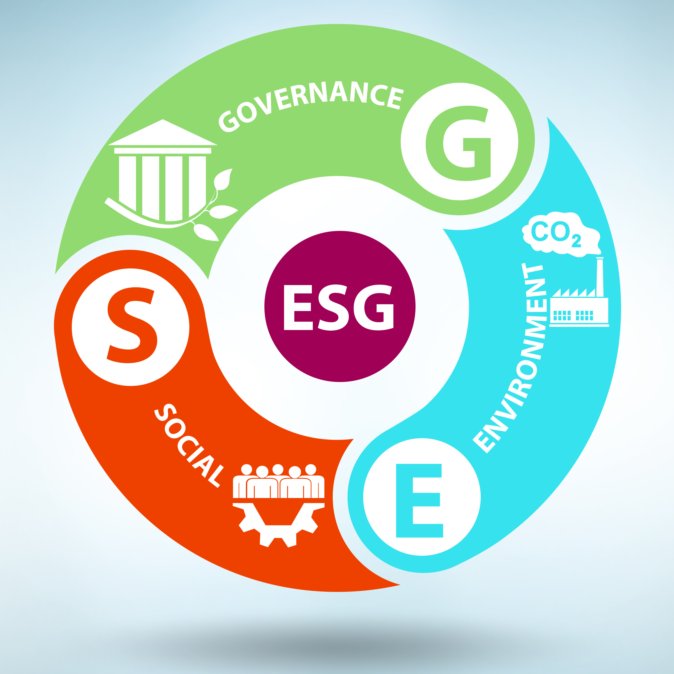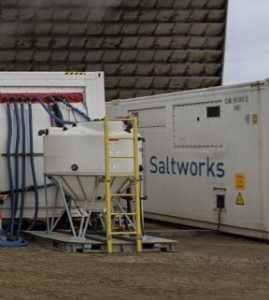ESG and Industrial Water: What Should Corporate Leaders Focus On?
Improving environmental, social, and governance ratings and reducing business risks with smart water investments
June 22th 2023
Environmental, Social, and Governance (ESG) performance is receiving greater attention from investors, customers, suppliers, and other stakeholders and is becoming a bigger part of future enterprise value. Today, ESG investments and initiatives account for almost US$40 trillion, often from large institutional investors.
For many companies, water plays a critical role in ESG and corporate social responsibility performance. With growing challenges and concerns around pollution, climate change, and consumption of energy, water, and chemicals, investing in responsible water management can measurably improve a company’s ESG profile while reducing operational risks.

Article Highlights
- Investors and consumers are making decisions that support ethical and sustainable businesses.
>Who are some of the ESG leaders in water?
- Water is a critical operational and ESG consideration. Good water projects have positive knock-on effects, improving many ESG metrics.
>Achieving maximum impact with water projects
- Saltworks’ solutions have lowered operating costs and greenhouse gas (GHG) emissions, ensured regulatory compliance, reduced chemical consumption, and improved water security for our corporate clients.
>Corporate water solutions and ESG outcomes
- Water withdrawal, consumption, discharge, and disposal are all intimately linked and can be improved together.
>Water ESG metrics
- ESG data disclosures are assessed by external ESG rating agencies.
>Where do ESG scores come from and what makes a good ESG report?
Who Are Some of the ESG Leaders in Water?
According to CDP’s Global Water Report 2020, companies reported maximum financial impacts of water risks at over US$300 billion—about five times higher than the cost of addressing them. However, many companies have been rapidly increasing their investments in water infrastructure and almost two-thirds are reducing or maintaining their freshwater withdrawals.
Some of the key leaders in water stewardship, as recognized by ratings agencies, include:
- Microsoft, committed to replenishing more water than it consumes by 2030,
- L’Oréal, committed to recycling and reusing 100% of the water used in its industrial processes by 2030 in its “water-loop” factories,
- Intel, committed to restoring 100% of its water use by 2025.
Achieving Maximum Impact With Water Projects
Partnering with the right water technology solutions provider can lead to positive outcomes that contribute to various ESG factors:
- Environmental: implementing advanced water projects has benefits including reducing water withdrawal from the local supply, lowering power consumption, reducing off-spec discharge risk and license-to-operate challenges, reducing offsite trucking of residual waste, and freeing up space and land. The net effects can include lower costs and GHG emissions and have positive impacts on biodiversity.
- Social: smart water projects leave more water in the local balance for stakeholders, reduce trucks on local roads hauling chemicals, build trust with communities, improve health and safety, and foster positive employee morale.
- Governance: forward-looking water management protects against business risks, maintains permits-to-operate, enables pride in open reporting of water performance metrics, and when executed with intelligent automation, helps asset owners to understand and report on performance and data. Removing bottlenecking of processes limited by water withdrawal or discharge limits can unlock large productivity gains in some industries, enabling increased business performance.
From starting out with measurements to implementing successful full-scale projects with our corporate clients, we know how important it is to reach a sustainable, cost-effective solution. From a governance point-of-view, it is critical to be sure of a project’s fit before full-scale implementation. No two projects are the same, but the six-step pathway below provides a general outline of how corporate wastewater projects can proceed with appropriate risk management. Companies should advance water projects with stage-gated investments, ensuring confidence in the technologies and vendors.

Build a full-scale solution that addresses project goals.
Corporate Water Solutions and ESG Outcomes
Saltworks helps customers manage wastewater in smart ways, often beyond the limits of conventional technologies. Our project outcomes include increasing freshwater recovery, reducing energy and chemical consumption, and reducing health and safety risks with intelligent automation. The following are some examples of recent water projects with highlighted improved ESG outcomes for our customers:
| Water Treatment Solution | Key ESG Outcomes |
|---|---|
| Targeted treatment of chlorides in an industrial discharge pond to enable wastewater reuse. |
|
| Treated an industrial site's impacted groundwater to meet drinking water standards, powered by waste heat thermal energy. |
|
| Enabled an advanced materials manufacturer to concentrate and recycle a solvent used in their production process. |
|
| Treated a mixed wastewater from an industrial site at 98% freshwater recovery. |
|
| Reduced volume by 5X prior to off-site trucking by installing a waste heat driven concentrator. |
|
Water ESG Metrics
Freshwater access is a recognized United Nations (UN) human right. UN Sustainable Development Goal (SDG) #6 from the 2030 Agenda for Sustainable Development is to “ensure availability and sustainable management of water and sanitation for all”. A plentiful, stable freshwater supply is essential to the vast majority of industrial processes and businesses. Responsible withdrawal of freshwater reduces water scarcity risk to the business, alleviates demand from municipal treatment plants, and frees up freshwater as a shared resource, ensuring a stable supply for both businesses and communities. Furthermore, clean bodies of water such as oceans and rivers are critical water habitats and contributors to biodiversity.
Water is a direct and indirect driver of many ESG metrics, making it extremely important to overall scores. While numerous standards for water metrics exist (GRI 303: Water and Effluents is one example) most share the same important water disclosures.
Reporting Your Water
To provide an understanding of a company’s relationship with water, ESG disclosure can describe where and how the water required for a company’s operations is being withdrawn, how that water is being consumed—such as how it is used to provide products or services, and how any residual water is discharged or disposed of. Companies may also describe their current practices for identifying and measuring water-related impacts and how they are addressed. Further reporting can describe how the company’s wider supply chain withdraws, consumes and discharges water, as well any actions taken to improve water stewardship.

Water Withdrawal
Water withdrawal is most commonly reported by volume and source, such as seawater, brackish water, and most importantly freshwater. Additional reporting details may also be advisable or required, such as describing activities in regions facing drought or other water stress, regulations or other factors curtailing water withdrawal, or other operations competing for access to the same water sources. There are a number of useful resources to identify regions of water stress including the World Resources Institute’s Aqueduct tool.
Water Consumption
Water consumption can be measured directly or inferred by calculating the difference between withdrawal and discharge volume. Water intensity is a related term, defined as the water used per value added, often given in cubic meters per dollar. Another term, the water use ratio, is defined as the total water usage volume divided by the total produced volume. Companies sometimes present these metrics on a per revenue basis, thereby accounting for water consumption relative to company growth. Treating wastewater for reuse can reduce both the amounts discharged and withdrawn, thereby reducing consumption.
Wastewater Disposal or Discharge
Companies should report their water disposal or discharge in terms of volume, location and water quality. Location reporting should consider all methods of disposal, including to surface water, groundwater, or the ocean as well as water sent to other organizations. Quality refers to all physical, chemical, and biological characteristics and any impacts to the environment or health and safety, such as to aquatic ecosystems or human health, should be monitored carefully and addressed. Our industrial wastewater treatment page provides an overview of the challenging constituents that wastewaters can contain.
Companies should describe the standards they use for effluent discharge quality and how they are met. Compliance with best-practice standards and industry- and region-specific regulations protects the company legally, keeps the environment safe, and is particularly important for the company in maintaining its public consent to operate. If applicable, details of non-compliance incidents should be disclosed.
What Makes a Good ESG Report?
Many companies publish ESG data as part of their regular reporting to stakeholders. Reports typically highlight information that is most important to investors, highlighting issues likely to impact a company’s operations or financial performance.
A thorough report should provide quantitative data as required by one or more reporting frameworks and qualitative analysis from its leadership including a forward-looking assessment of the company’s ability to manage ESG challenges and risks. For quantitative measures, a company’s scores should be compared with past performance and industry peers. In some larger companies, a dedicated ESG team works to measure and improve key metrics. Such teams can be composed of cross-disciplinary teams that include accountants, project managers, engineers, and others. Outside consultants can provide expertise in specific areas (e.g. climate) or provide independent oversight and assurance.


Where Do ESG Scores Come From?
In some cases, an ESG report may offer an opportunity for a company to publicly address controversies or previous shortcomings, perhaps showing steps taken or plans to address particular concerns.
ESG rating agencies such as MSCI and Sustainalytics score companies based on these reports, other publicly disclosed policies, and data from governments and NGOs. Frameworks such as GRI and CDP allow the comparison of data between different companies.
Conclusion
- ESG matters more than ever. Companies are increasingly reporting on and working to improve their ESG performance.
- Water is a critical ESG consideration and having a clear understanding of water withdrawal, consumption and discharge practices is an essential part of ESG.
- Reducing water consumption including through wastewater reuse is particularly important in water-scarce regions while discharging water in a compliant way is a critical environmental and legal issue.
- Sound ESG reporting considers quantitative data, qualitative analysis from company leadership, and an assessment of challenges and risks.
- Smart water projects can improve many ESG metrics. Saltworks recently completed a project demonstrating 99% freshwater recovery compared to a conventional competitor’s 80%.
Contact us to get started on achieving your ESG targets.
About Saltworks
Saltworks Technologies is a leader in the development and delivery of solutions for industrial wastewater treatment and lithium refining. By working with customers to understand their unique challenges and focusing on continuous innovation, Saltworks’ solutions provide best-in-class performance and reliability. From its headquarters in Richmond, BC, Canada, Saltworks’ team designs, builds, and operates full-scale plants, and offers comprehensive onsite and offsite testing services with its fleet of mobile pilots.



